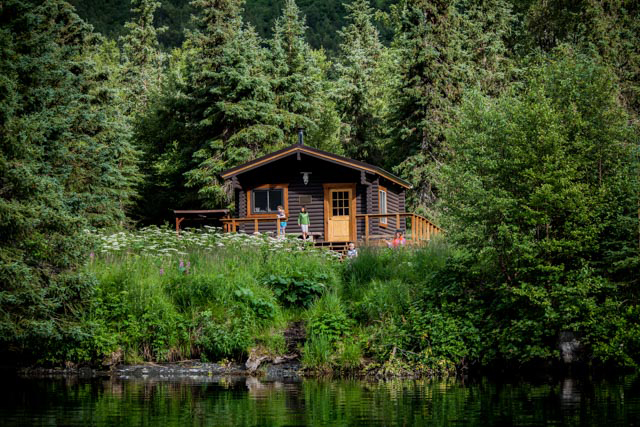Editor’s note: This story has been changed to correct the cabins in Tongass National Forest and the completion year of the National Forest Service market survey.
Kenai resident Ryan Marquis and his family have made a tradition of staying at Barber Cabin in Chugach National Forest — a 320 square foot log cabin on the shore of Lower Russian Lake approximately 3.5 miles from the Russian Lakes trailhead — for the last several years.
“It’s a nice hike in, but it’s a really well-maintained trail — you can get in and out really easily,” Marquis said. “It’s a nice, secluded cabin on a lake… it’s really beautiful country back there, a nice place to go spend a few days.”
The cabin includes tools for splitting firewood — which Marquis said his family usually brings from the trailhead in a wagon — and a metal canoe for boating on Lower Russian Lake.
Barber Cabin can be rented for a daily fee of $45. The National Forest Service has proposed increasing the daily rate for Barber Cabin and the 40 other rental cabins in Chugach National Forest by between $15 and $65.
At the end of the three years the National Forest Service will use to implement the fee change, Barber Cabin will cost $75 per day during the peak season — between May 15 and August 31 — and $50 per day the rest of the year.
143 cabins in the Tongass National Forest will see similar rate increases.
Chugach’s Seward District Recreation Program Leader John Eavis, who oversees maintenance of the 18 cabins in the district, said inflation has driven up the cost of materials and transportation for his workers. Most of Eavis’ cabins are within 2-15 miles of a trailhead, but three on the eastern peninsula are accessible only by floatplane, which Eavis estimated costs around $800 per trip.
“(Maintenance needs) can be a pretty wide variety of wear and tear from users, weather, and aging,” Eavis said.
Items that often need to be repaired or replaced include chimneys, woodstoves, windows, bunks and counters, decks and stairs, and boats. In addition, Eavis said his crews have to dig new outhouse pits every three to ten years, depending on a site’s popularity.
According to a Forest Service Frequently Asked Questions document, Chugach has spent about $314,500 on its cabins in 2015. Of that expense, $140,000 — about 44% — has come from fees, with the rest being funded by federal appropriations that Eavis said have shrunk in recent years.
Based on inflation and use trends, the U.S. Forest Service calculated that Chugach will spend $368,000 on its cabins in 2019. After the third year of rate increases, the Forest Service expects fees to fund 70 percent of this cost.
According to an information release by the National Forest Service, “revenue from cabin rental fees has remained mostly static since the 1990s, (while) operations and maintenance costs have changed over time.” The proposed increase follows a market appraisal finished in 2007.
Currently, most of the Chugach cabins cost $35 per day in the peak season, with four that cost $25 per day and eleven that cost $45 per day. Right now, non-peak daily rates are either $25, $35, or $45.
In the first year after the rate change, all rentals will be set at $50.
For many cabins, this will remain the permanent non-peak rate. However, 20 high-use cabins will see a peak-season increase to $60 per day in the second year, and an increase to $75 the next year.
Two cabins near Cordova accessible only by plane — at Martin Lake and Nellie Martin River — will increase to $100 per day by the end of year three.
Marquis said the increased prices wouldn’t make him hesitant about using the cabins.
“We started going to different cabins years ago, in part because of how cheap they were,” Marquis said. “It was a cheap way to do vacations locally, but even at (the increased) price, I think it’s worth it. It’s a good value still.”
Lisa Beranek, a member of the Kenai Peninsula Outdoor club, said she has previously rented Chugach’s cabins at Upper Russian River, Aspen Flats, Resurrection River, and the Barber and Dale Clemens cabins — at daily rates that currently range from $35 to $45 but will rise after three years to between $60 to $75.
Beranek said that while $45 is a usual daily price for cabins she has rented in the past — both in Chugach and elsewhere — local cabins are above-average in her experience.
“As someone who’s lived outside the state of Alaska and enjoyed public-use cabins on federal and state land, some of the cabins up here are the nicest cabins I’ve ever seen or stayed in,” Beranek said. “In parts of the Lower 48 I’ve paid $45 to stay in a fire lookout that has a giant hole in the roof and rain coming in around the woodstove. So I think as long as funds are being spent responsibly and efficiently to take care of those cabins and keep them in good condition for future use, then I’m totally okay with that.”
Alaska’s Regional Forester Beth Pendleton will decide when the new fees will take effect.
The Forest Service will take public comments on the proposed increase until Nov. 30.
Comments can be made either online or by phone at (907) 586-8804.
Reach Ben Boettger at ben.boettger@peninsulaclarion.com

